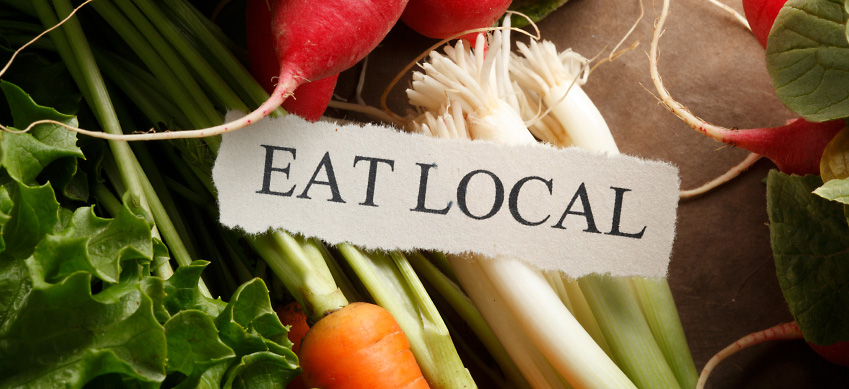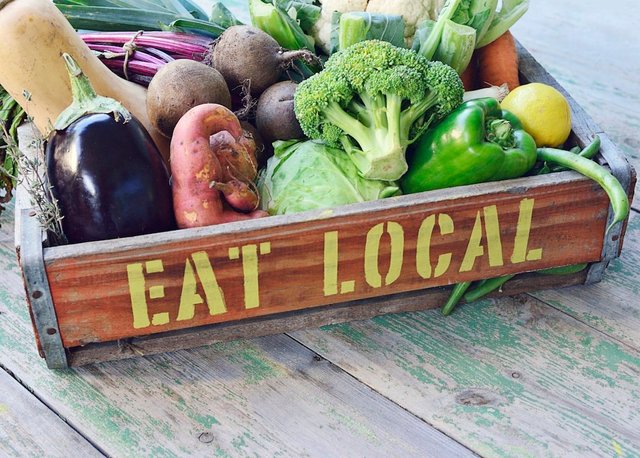Let's go happy with Local Food System

One of the most serious problems on this planet is a lack of food resource. Dr. Evan Fraser, a geography professor and Canada Research Chair with an expertise in global security issues, insists that we have to change our current food system. In our current food system, corporations have control over producing and distributing food nationwide or all over the world. Dr. Fraser says, “Big corporations using farming systems damage the environment, exploit workers, and displace traditional farmer. Food systems based on local, diverse and small farms that use few chemical inputs like pesticides or fertilizers are more sustainable, equitable and democratic,” (2014). What he means by this is that the global industrial food system is not a proper system anymore. Increasing population, climate change, and the high price of energy will make it harder for the food industry to produce enough and safe food for all humanity over the next generation. While a lot of controversy exists about this problem, Dr. Fraser suggests a local food system as a solution which will make food production more sustainable, efficient, and healthier.
What is a local food system exactly? The term "local food system" is used to describe a process of food production and distribution that is localized, rather than national or international. In a local system, food is grown and harvested close to consumers' homes, then distributed within shorter distance.
Dr. Evan Fraser made me think of several problems that are related to our current food system. After doing my own research, I came to the conclusion that the local food system is a great alternative for us. I agree with Dr. Fraser and I am going to explain why we should adapt local food systems with three main reasons: a local food system would reduce food waste, decrease unemployment, and allow people to consume safe food with more knowledge about nutrition.

First of all, I support the idea of a local food system because it can reduce food waste. The U.S. Department of Agriculture (USDA) estimates 31 percent of our post-harvest food supply is thrown away everyday in the U.S. instead of eaten. This amount of food can fill a 92,542-seat stadium according to Roni Neff, program director at the Bloomberg School of Public Health (2015). Usually in our current food system, food waste occurs from farms, long transportation and distribution process, food overbuying by households, and so on. A local food system would dramatically reduce this food waste because its process of food production and distribution is much shorter than the current global food system. Also, aside from the production and distribution processes, households themselves can reduce their food waste by participating in the local food trade system such as homemade meal trading and home-grown ingredients trading. In this way, people do not have to throw away a bunch of food and leftovers when the local food system gets bigger.
Next, a local food system would influence our economy positively by increasing local employment and productivity. As the world becomes more globalized, automation of labor in the agricultural industry as well as in retail businesses is one big factor of increasing unemployment. Local food hubs can expand the market of small, local farmers, and create local jobs. Another economic benefit of localized food production is that it will bring us a better understanding of local demands which leads to better control of supply management. A good example of this is shown in the case of a rural town called Forest Grove in Oregon. In Forest Grove, a community-based, non-profit organization supported by the USDA, Adelante Mujeres, increased producers’ and consumers’ knowledge about local growing conditions by hiring and training local Hispanic people. Also, since farmers could better understand consumer’s demand with regular community meetings, consumers could get exactly what they wanted. Starting with a 27 percent poverty rate, this movement doubled the number of consumers to the local farmer’s market, improving the local economy (Chicago Metropolitan, 2015).
Lastly, a local food system would educate people more about nutrition, and they would have access to safer food than the current food system. In the current global food system, since corporations have too much control on marketing and packaging, customers have less freedom for access to accurate information about correct labeling, whether the food is safe from chemicals, and so on. The USDA reported that a label saying “Made with Whole Grains,” even if the product is not healthy because it is processed food, makes people want to purchase that product because it indicates health benefits of whole grains (Donovan, 2010). However, as Dr. Fraser said, in a local food system, the local farmers can efficiently control a small area with fewer pesticides and harmful chemicals. For example, The Chicago Metropolitan Agency for Panning (CMAP) created Lake County policies to support a local food system. This policy made a forum like a food policy council to discuss local food issues connecting stakeholders, buyers, and sellers. In this process, neighborhoods share ideas and knowledge about producing healthy food and this is becoming more and more popular (2015). This case also shows that when the participation rate of people in local culture goes up, people will be more interested in and learn more about nutritious information and how the food production system works because the local food system will be directly related to their lives.
Even though the local food system has a lot of benefits, some people may argue that it would result in a lack of diversity of foods and we will get only restricted kinds of foods that can be grown only in local farm. An article from the health blog, Topline Foods & Cardio, says, “This may work pretty well for states like California, famous for their agricultural variety and expansive seashore, but what about states which are mostly desert?” I agree with this. However, I am not saying that we have to only have a local food system. While maintaining the current global food system for certain foods that cannot be grown nearby customers, we have to gradually expand this local food system step by step. Combining benefits from both local and global food system will maintain the diversity of food and ingredients, and make our food system much more sustainable.
Dr. Evan Fraser explains why the food system of the Roman Empire went wrong due to exploited soil and too much dependence on nice climate. “In every single historic case, something at some point went wrong with the food system,” he says. When the weather and the quality of local soil was bad, local people were not able to feed themselves. He added, “And the cities, then, no longer were able to feed themselves, and people floated away (2010, para. 7).” The history of Roman Empire shows how a global food system can destroy the local economy. Likewise, the problem we face today is very similar. Our natural resources are under pressure because of growing population and climate change. These limitations that we are facing in this modern day shows that everyone on this planet needs to know that our food system should be changed. Therefore, the entire process of production, processing, distribution, and consumption needs to be adjusted with local food system to reduce food waste, increase employment, boost local economy, and lead us to healthier food.
References
Donovan, T. W. (2010, June 20). 9 Most Misleading Food Labels. Retrieved November 2, 2016, from http://www.huffingtonpost.com/2010/04/20/9-most-misleading-food-la_n_538868.html?slideshow=true#gallery/6080/2
Fraser, E. (2014, Feb 21). Feeding Nine Billion Video 5: Local Food Systems by Dr. Evan Fraser [Video File]. Retrieved from
Is Eating Local Always Best? [Web log post]. (n.d.). Retrieved November 2, 2016, from http://www.toplinefoods.com/eating-local-pros-and-cons/
Jensen, B. (2015). America's food waste problem is bigger than you think. Retrieved November 01, 2016, from http://hub.jhu.edu/magazine/2015/fall/america-food-waste/
Raz, Guy. "How We Eat, Produce Food Could Bring Down Society." National Public Radio. N.p., 7 Aug. 2010. Web. 02 Nov. 2016. http://www.npr.org/templates/story/story.php?storyId=129052445
The United States. Chicago Metropolitan Agency for Planning. The Local Food System. N.p., 2015. Web. 2 Nov. 2016. http://www.cmap.illinois.gov/documents/10180/183789/FY12-0115-LOCAL-FOOD-BROCHURE.pdf/28725bc2-55fc-4082-8b1e-90d2c2dc3947
The United States. United States Department of Agriculture. HEALTHY FOOD ACCESS. N.p., 2015. Web. 2 Nov. 2016. http://www.usda.gov/documents/7-Healthyfoodaccess.pdf
@resteemator is a new bot casting votes for its followers. Follow @resteemator and vote this comment to increase your chance to be voted in the future!